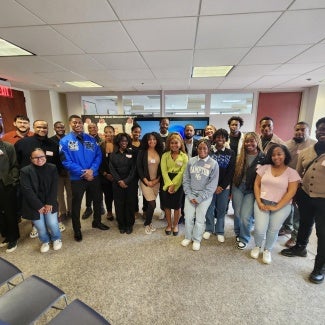Nine Arab American architects you should know
For Arab American Heritage Month we highlight the extraordinary work and careers of nine architects, designers, and academics whose paths from disparate parts of the world brought them to the United States where their work will leave a mark on this land, our neighborhoods, and our profession.
By Jenine Kotob, AIA and Greg Menti
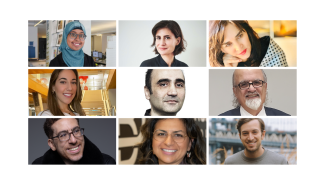
Approximately .3% of AIA members descend from the Middle East and North Africa, or MENA. In 2021, the Association of Collegiate Schools of Architecture reflected on the MENA population in a research study entitled, “Where are my people? Middle Eastern and Northern African in Architecture.” ACSA’s report revealed a policy of invisibility and erasure of the large and diverse MENA population in the United States, who historically have been categorized under White/Caucasian in the census and all government data metrics. That has recently changed, with a decades-in-the-making milestone achievement, creating a new MENA category for U.S. federal government standards for racial and ethnic data collection.
MENA is a broad region that is comprised of 22 countries, spanning from the Atlantic coast of Africa to the borders of Pakistan and Afghanistan in Central Asia and from the Mediterranean shore to the southern boundaries of the Sahara Desert. There are many languages spoken across this vast geography, but Arabic is the predominate language shared even beyond this footprint and is claimed as the primary language by at least 25 countries such as, Chad, Libya, Mauritania, Somalia, Tunisia, and more.
If it were not for language, the broad range of diverse individuals in this list would have minimal reasons to be connected. But the power of Arabic, an ancient and rich language, is that it carries with it centuries of oral and written narrative, passed down from generation to generation. A romantic tongue, it spans continents and much like design, it has come to reflect nuanced local attitudes and vernacular styles.
To celebrate Arab American Heritage Month, we’re uplifting the work and voices of Arab American architects, designers, and academics across the United States. You may have heard of architects like Zaha Hadid, but we’re excited to share the work of these leaders who are making innovative strides in design, academia, technology, and equity.

Razan Altiriafi, Assoc. AIA, design applications manager, Perkins & Will, Durham, NC
Sudanese American
Altiriafi was always interested in architecture, but as the eldest daughter of Sudanese immigrants, she was encouraged to study medicine or engineering. Eventually she graduated from Georgia Tech with a Master of Architecture. Since then, she has combined her design degree and passion for technology to improve the way designers work.
In December 2022, after over a decade away, Altiriafi visited Sudan for her cousin's wedding. Being surrounded by family from around the globe reminded her of why she pursued architecture in the first place. Four months after visiting, war broke out in Sudan and much of her family fled the widespread destruction. From the stalls she browsed in the open air market to the airport she departed from, little remains.
Since the pandemic, designers have had to find new ways to connect and collaborate on architectural projects, while much of the technology that is taken for granted has been cut off in Sudan. Altiriafi maintains the belief that architecture is inherently political, and while she has fought for increased diversity and equity within her profession here at home, her ancestral home is also suffering. She hopes to continue to stand for those whose voices aren't heard and promote a better future for all, especially within the field of architecture.
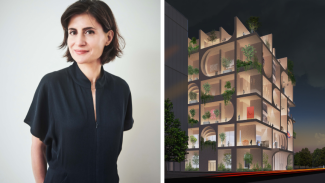
Amale Andraos, AIA, HFRAIC, co-founder and principal, WORKac, dean emeritus at Columbia University, New York, New York
Lebanese American
Amale Andraos, AIA, HFRAIC, is a principal of WORKac, which she co-founded with her partner Dan Wood in 2003. WORKac is an award-winning woman-owned practice that believes in the power of architecture and design to engage environmental and social concerns towards a more creative, equitable, and sustainable future. The practice’s work throughout the US and around the world emphasizes a deep engagement with local cultures, climates, and histories, with a focus on public, cultural, and institutional projects that reinvent how we live, work, learn, and experience the world together.
WORKac was the recipient of the 2023 Arts and Letters Award in Architecture, was named the #1 design firm in the US by Architect Magazine, as well as selected as an AIA New York State "Firm of the Year.” The practice has achieved international acclaim for projects such as the Edible Schoolyards NYC and the RISD Student Success Center and was most recently awarded the 2023 AIA New York Honor in Architecture for Marea in Batroun, Lebanon, and the 2023 AIA New York Honor in Interior Architecture for Adams Street Library in Brooklyn. Current projects include the Beirut Museum of Art, the North Boulder Public Library, the Sibley Dome Renovation at Cornell University, and the Sultan Haitham City Cultural Center in Oman.
Andraos is professor and dean emeritus of Columbia University's Graduate School of Architecture Planning and Preservation (GSAPP). She also served as Architecture Advisor to the President and Special Advisor for the Climate School. As the first woman dean of the school (2014-2021), Andraos strived to empower the next generation of architects, scholars, and practitioners of the built environment to explore new modes of practice and imagine new forms of engagement with a particular focus on climate change, social equity, and the impact of data and technology on architecture and cities. During her tenure, the school also made meaningful strides towards increased diversity and representation among faculty and students.
She was named one of the "25 Most Admired Educators for 2016" by DesignIntelligence, which described her as integrating "real-world problems into the curriculum with a bold vision and strong leadership." Her publications include The Arab City: Architecture and Representation, co-edited with Nora Akawi, as well as We'll Get There When We Cross That Bridge, 49 Cities and Above the Pavement the Farm in collaboration with Dan Wood.

Raya Ani, FAIA, LEED AP, founder and design director, RAW-NYC Architects, Dubai, United Arab Emirates
Iraqi American
Raya Ani is an award winning architect and urban designer celebrated for her dedication to innovative and sustainable architecture. With influential projects like Liberland, the Marshes of southern Iraq, and the Iraq Pavilion, she exemplifies a commitment to environmental, social, and economic sustainability. Raya's work embodies architectural excellence and positive global impact, solidifying her position as a visionary leader in the field of architecture.
A licensed architect in the state of New York, her career spans over 30 years and multiple continents, from Baghdad to Frankfurt, Boston, New York City, and Dubai. She is the founder and design director of RAW-NYC Architects based in New York City and Dubai. She seamlessly integrates innovative principles into her designs, emphasizing sustainability throughout. By minimizing ecological footprints and harmonizing with the natural environment, she utilizes sustainable materials and energy-efficient systems, setting a benchmark for environmentally conscious architecture.
She transcends traditional sustainability notions with transformative projects like her vision for the Southern Iraq marshes. This aims to inspire and empower indigenous communities to restore the ecosystem. Such architecture achieves a zero-carbon footprint, generates its own power, supports the local economy, and efficiently manages resources. It operates as a self-sustaining ecosystem, producing surplus energy and adding economic value to the community.
This transformative approach to architecture as a self-sustaining system integrates innovative technologies and design principles to create environments that not only harmonize with nature but provide renewable energy, economic opportunities, and vital resources contributing to the well-being and prosperity of society.

Sereen (Emaish) Atari, Assoc. AIA, founder, Arab Females in Architecture and Construction, Fairbanks, Alaska
Palestinian American
Sereen (Emaish) Atari is a dynamic architect whose passion for both design and societal impact has defined her flourishing career. With over three years of experience across diverse projects in states ranging from Florida to Alaska, she brings a fresh perspective to the field. She holds a master’s degree in architecture and is currently undergoing the rigorous process of completing her ARE exams. Furthering her dedication to professional and personal growth, she has set her sights on pursuing a PhD after completing the ARE exams. This ambition underscores her commitment to advancing knowledge and innovation within the field of architecture.
Atari's dedication extends beyond her professional achievements. Recognizing the underrepresentation of Arab women in architecture and construction, she took steps to address this disparity. In founding the Arab Females in Architecture and Construction (AFAC) community, she established a platform for empowerment and advocacy.
AFAC transcends ordinary organizational boundaries, embodying a vibrant network of support, inspiration, and empowerment for Arab women worldwide. Through her leadership, she has catalyzed tangible change, providing a vital space for Arab women to thrive, grow, and inspire the next generation of change-makers. In her diligent pursuit of equity and excellence, she epitomizes the transformative power of architecture to shape a more inclusive and empowered world.

Ziad Jamaleddine, Order of Engineers & Architects, Lebanon, founding partner, L.E.FT, and assistant professor of architecture at Columbia University Graduate School of Architecture, Planning and Preservation
Lebanese American
Ziad Jamaleddine is an assistant professor at the Columbia University Graduate School of Architecture, Planning and Preservation (GSAPP), and co-founder of L.E.FT Architects (Beirut/New York). He is a practitioner and scholar with a research focus on Islamic architecture in the Middle East.
His writings have been published in several journals and books including The Arab City: Architecture, and Representation (Columbia Books on Architecture and the City, 2016); Places Journal (2020, Forthcoming 2024), Journal of Material Cultures in the Muslim World (Brill, 2024), and International Journal of Islamic Architecture (Intellect, forthcoming 2024). His historical research on the architectural typology of the mosque has been exhibited at several arts and architecture venues, including Oslo Architecture Triennale (2016), Milan Architecture Triennale (2018), Sharjah Architecture Triennale (2019), and most recently Jeddah Islamic Art Biennale (2023).
Jamaleddine is the recipient of the 2002 Young Architects Forum Award, the 2010 Emerging Voices Award from the Architectural League of New York, and 2019 “AD50: The Middle East’s Brightest Talents in Architecture and Design”.
His architecture office L.E.FT, in partnership with Makram el-Kadi, was the 2009 Finalist in MoMa’s Young Architects Program, a member of Architectural Record’s 2010 Design Vanguard, and a finalist for the 2010 Iakov Chernikhove Prize. Among his built projects is Shakib Arslan Mosque, Lebanon (2017), winner of the AIA Faith and Form Award (2018) and Al Fozan Award for Mosque Architecture, Third Cycle: “Mosque architecture in the twenty-first century” (2022).
L.E.FT has just completed the Office of Religious and Spiritual Life and Contemplative Practices (RSLCP), at Vassar College, New York (2023), winner of the AIA Faith and Form Award in the category of Religious Architecture: Adaptive Re-use/Re-purpose (2023), and is currently developing The Center for Human Rights and the Arts, at Bard College, New York.
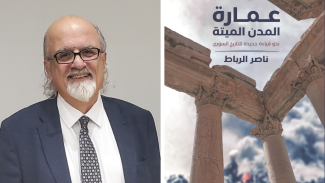
Nasser Rabbat, Aga Khan professor and director of the Aga Khan Program for Islamic Architecture, Massachusetts Institute of Technology, Cambridge, Mass.
Arab American
Professor Rabbat has worked at the Massachusetts Institute of Technology for more than 30 years and is currently Aga Khan professor and director of the Aga Khan Program for Islamic Architecture. His interests include Islamic architecture, urban history, heritage studies, Arab history, contemporary Islamic art, and post-colonial criticism. Professor Rabbat has published numerous articles and several books on topics ranging from Mamluk architecture to Antique Syria, 19th century Cairo, Orientalism, and urbicide.
His most recent books are Writing Egypt: Al-Maqrizi and His Historical Project (2023); Nasser Rabbat: Critical Encounters (2023); and ‘Imarat al-Mudun al-Mayyita (The Architecture of the Dead Cities) (2018). He is currently editing a book on the cultural history of Syria, tentatively entitled, Syria: The Land Where Cultures Met, and writing a history of Mamluk Cairo.
Prof. Rabbat worked as an architect in Los Angeles and Damascus and taught at the Ludwig-Maximilians-Universität, Munich; École des hautes études en sciences sociales, Paris; and NYUAD, UAE. He held several research appointments in Cambridge, Princeton, Los Angeles, Cairo, Granada, Rome, Paris, Doha, Bonn, and Florence. He regularly contributes to several Arabic newspapers and consults with international design firms on projects in the Islamic World. Professor Rabbat served as a member of the 2019 and the 2022 Aga Khan Award for Architecture Steering Committees.
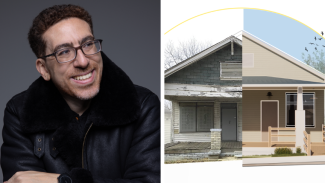
Dr. Tarek Rakha, associate professor of architecture, director of High Performance Building Lab at Georgia Tech and co-founder and CEO of Lamarr.AI, Atlanta, GA
Egyptian American
Dr. Tarek Rakha stands at the forefront of integrating technology and environmental sustainability within architecture, emphasizing support for underserved communities through his dual roles in academia and entrepreneurship. As an associate professor of architecture and the director of the High Performance Building Lab (HPBL) at Georgia Tech, alongside his position as the co-founder and CEO of Lamarr.AI, he merges his architectural expertise with cutting-edge technology. His journey in academia transitioned from Syracuse University to Georgia Tech in 2019, following his Ph.D. in Building Technology from MIT.
His research ambitiously explores the synergy between aerial robotics, urban energy sensing, and outdoor thermal comfort, aiming to enhance building diagnostics and urban resilience. Garnering over $7M in funding from prestigious federal agencies, state authorities, and private sectors, his scholarly contributions have significantly impacted both academia and industry, evident in his national recognition and numerous publications.
Beyond his research, Dr. Rakha is deeply committed to education, where he bridges design and technology with societal needs, particularly focusing on climate change and social justice. His pedagogy was celebrated with the Georgia Tech Student Recognition of Excellence in Teaching: Class of 1934 Award, showcasing his impactful teaching methodologies. His mentorship led students to triumph in prestigious competitions, notably winning the 2020 DOE’s Solar Decathlon Design Challenge, underlining his dedication to fostering future leaders in sustainable design. Furthermore, Tarek's service extends to professional communities, highlighted by his leadership of the SimAUD conference in 2018 and 2019, enriching the discourse on simulation in architectural and urban design.

Shahad Sadeq, Assoc. AIA, architectural designer, Buxton Kubik & Dodd, Springfield, Missouri
Iraqi American
Originally hailing from Iraq, Sadeq was born and raised in Abu Dhabi, U.A.E. From an early age, she recognized the profound impact architecture holds in shaping and binding the social fabric. Peering out of her skyscraper apartment window, she witnessed skeletal structures transform into architectural marvels. However, beneath the glamour lay a grim reality of a slave labor industry entrenched within the economy. It was these experiences that planted the seeds of advocacy deep within her heart.
Fast forward to her journey in the US: after obtaining a master's degree in architecture from Drury University, her career has been a journey of exploration across diverse industries and cities. Throughout this journey, advocacy has remained a constant thread.
Among her proudest endeavors stands not a singular project, but rather a collective effort: the Immigrant Architects Coalition. This initiative sprouted from a session at the AIA National Conference in 2019. Alongside Yu-Ngok Lo, FAIA, CDT, LEED AP, NCARB and Graciela Carrillo, AIA, NCARB, LEED AP BD+C, she recognized the pressing need to support immigrant architects in the US. They pooled their time, networks, and resources to shepherd immigrant architects both domestically and abroad. Five years down the road, the efforts have borne fruit: a book, podcast, scholarship, mentorship program, and several exciting initiatives currently in progress.
Throughout her career, Sadeq has had the privilege of working on remarkable projects and forging connections with incredible individuals both nationally and globally. Her greatest aspiration is to leave behind a legacy defined by unwavering dedication to lifting others to greater heights than she could ever reach herself.
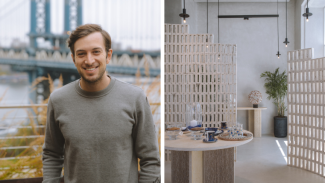
Bisher Tabbaa, managing principal, FADAA, Brooklyn, New York
Jordanian American
Bisher Tabbaa, Managing Principal at FADAA, co-founded the practice with a strong belief in architecture being an active agent in creating positive change to the climate, culture, and society. He has a Masters of Architecture from Columbia University GSAPP where he also held the position of Materials and Design Specialist at the Natural Materials Lab. At Columbia University, Bisher co-founded Masaha, an organization dedicated to researching contemporary issues facing the Arab world.
Bisher has designed projects in New York City, London, Dubai, and Amman, ranging from large scale master plans to installations that push for innovative solutions that reflect FADAA’s unwavering commitment towards a symbiotic relationship between architecture, climate, and culture. Bisher is a frequent guest critic on juries at Columbia GSAPP, Cornell, and Syracuse University.

